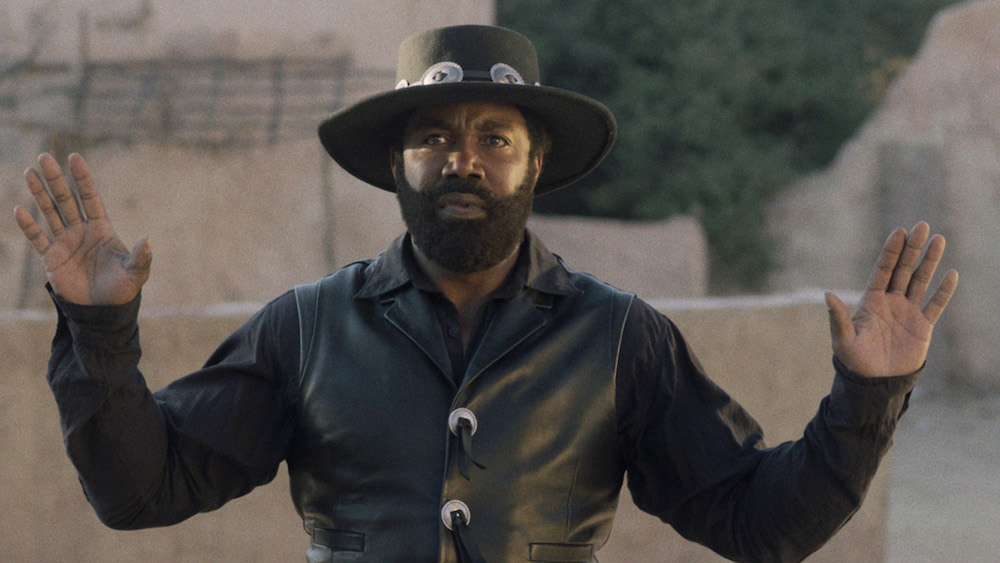
Tipping their Stetsons to a passel of 1960s Spaghetti Westerns — everything from “A Fistful of Dollars” to “They Call Me Trinity” — and the sort of 1970s Blaxploitation oaters that once provided steady employment for Fred Williamson, director-star Michael Jai White and co-star (and co-writer) Byron Keith Minns have cobbled together “Outlaw Johnny Black,” a fitfully funny but uncomfortably overlong entertainment best appreciated by movie buffs who share the pair’s affection for the genre tropes and stereotypes they seriocomically recycle.
Not nearly as free-wheeling and fleet-footed as “Black Dynamite,” the 2009 satirical comedy that cast White as a Shaft-like action hero, the new film nonetheless provides more than a few good laughs, even when it seems to be taking horse opera clichés a tad too respectfully, and showcases a fine cast of actors dedicated to both the silliness and the seriousness of the enterprise.
White plays the title character, a notorious gunslinger and brutally efficient martial artist who has devoted most of his adult life to seeking vengeance for the murder of his father, preacher and trick shootist Bullseye Black (played briefly but impactfully in flashbacks by Glynn Turman). Much like Lee Van Cleef in “For a Few Dollars More,” who carried the image of his late sister in his pocketwatch to inspire his score-settling pursuits, Johnny carries a picture of Bullseye in his own timepiece, to fuel his determination for retribution. But wait, there’s more: Johnny also carries with him a bullet with the name of his quarry — gang leader Brett Clayton (Chris Browning) — written upon it.
Trouble is, Johnny is repeatedly interrupted on the vengeance trail by lawmen, bounty hunters and other nuisances who want to collect the bounty on his head, or arrest him on trumped-up charges, or both. He barely escapes hanging thanks to the intercession of grateful Indians he saved from racist bullies, but nearly dies in the wilderness after his horse literally and figuratively kicks the bucket. Fortunately, he’s saved by Reverend Percy (Minns), who’s on his way to assume the open job as preacher — and claim the hand of Bessie (Erica Ash), his lovely pen pal — in the predominantly Black town of Hope Springs. Even more fortunately, when the reverend is sidetracked, Johnny is able to assume his identity and seek temporary refuge in a place where no one, not ever Bessie, has ever seen him before.
Clocking in at 136 minutes, “Outlaw Johnny Black” is replete with stretches where the passing of time and the shortage of full-throttle hilarity are keenly felt. There’s a welcome hint of “Blazing Saddles” to the scenes where Johnny interacts with members of his credulous flock — and to a wink-wink, nudge-nudge moment when someone does a Mongo and punches out a horse. But more often, surprisingly enough, “Outlaw Johnny Black” is appreciably less jokey, if not downright sincere, as it fills the gaps between laugh-out-loud funny business by focusing on the machinations of a rapacious land grabber (Barry Bostwick) who covets the oil-rich property of Bessie’s equally beautiful sister, Jessie (Anika Noni Rose).
(And yes: It’s a weird coincidence to have so soon before the theatrical release of “Killers of the Flower Moon” another movie about white villains trying to keep people of color from exerting their rightful claim to oil fortunes.)
Scattered throughout “Outlaw Johnny Brown” are some savagely comical references to racist outrages that are almost shocking in their brazenness. Among the charges leveled against Johnny: “Train robbery, horse thievery and improper white women eye contact.” Later, someone expresses fear that rumors of Black men raping white women in Hope Springs may lead to violence by vigilantes. And while it may take a minute or two (or more) for some viewers to grasp the satirical intent of the filmmakers, the casting of obvious palefaces as Native Americans is a sly jab at the tradition of similar casting in classic and not-so-classic Hollywood Westerns.
But for some viewers, the most memorable moment will be one saved for the end, when two Blaxploitation Western veterans (including one to whom this movie is dedicated) make cameo appearances to more or less pass the torch on to White. That may not make you guffaw, but it should certainly leave you with a smile on your face.













